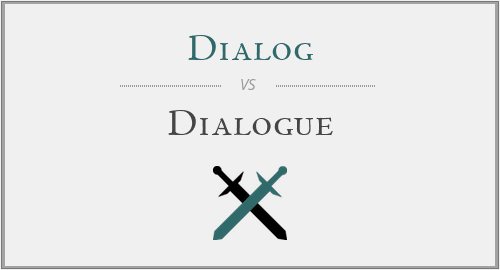I wrote a dialogue between a customer and a shopkeeper.
I wrote a dialog between a customer and a shopkeeper.
Which of the above sentence is correct? Is a longer dialogue a dialogue and a shorter one simply a dialog? What is the difference between a dialogue and dialog?
This article answers all these questions in an easy way along with what a dialogue is, its usage, origin and examples. Have a good read!
Origin:
The word dialogue originated from Middle English: from Old French dialoge, via Latin from Greek dialogos, from dialegesthai ‘converse with’, from dia ‘through’ + legein ‘speak’.
Dialogue as noun:
Dialogue is used as a noun where it means a conversation between two or more people as a feature of a book, play, or film.
The book consisted of a series of dialogues.
A discussion between two or more people or groups, especially one directed towards exploration of a particular subject or resolution of a problem.
The USA would enter into a direct dialogue with Vietnam.
Dialogue as verb:

Dialogue is also used as a verb where it means to take part in a conversation or discussion to resolve a problem.
He stated that he wasn't going to dialogue with the guerrillas.
Dialogue or dialog:
A dialogue is a conversation between two or more characters in a book, play or movie or a conversation between two or more people in real life, especially when they are working together on a particular project or problem. In North America, dialogue is also used as a verb to mean to take part in a conversation in order to work toward a resolution of a particular problem or particular project. Related words are dialogues, dialogued, dialoguing. Dialog is an alternative spelling of the word dialogue that is primarily found in North America. This alternative spelling became popular in the 1980s when it became a computer term. This streamlined spelling has been transferred to other uses of the word dialogue, and has become the spelling that is used most often in North America, though the Oxford English Dictionary still shows the preferred spelling as dialogue.
Examples:
In a statement by its spokesperson, Jomo Gbomo, MEND indicated the former Permanent Secretary, Federal Ministry of Power, Godknows Igali, on Friday contacted it on the planned dialogue with Niger Delta groups. (The Premium Times)
Changing our hearts is critical to rooting out our prejudices and initiating candid dialogue about race and policing in our country. (The Columbia Dispatch)
A two-day meeting of the Task Force on Sino-Tibetan Negotiations held in Dharamshala, India, with a very strong commitment for peaceful resolutions to the issue of Tibet through dialogue with the Chinese government. (The Tibet Post)
They don’t know that a piece of software needs an update unless it creates a dialog box telling them so. (The Atlantic)
City, police leaders call for dialog in addressing protesters’ issues (The Commercial Appeal)
Tupelo Mayor: Justice Dept. to help dialog about police shooting (The Clarion Ledger)








Have a discussion about this article with the community:
Report Comment
We're doing our best to make sure our content is useful, accurate and safe.
If by any chance you spot an inappropriate comment while navigating through our website please use this form to let us know, and we'll take care of it shortly.
Attachment
You need to be logged in to favorite.
Log In